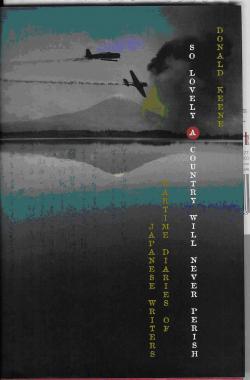So Lovely A Country Will Never Perish: Wartime Diaries of Japanese Writers
by Donald Keene
Columbia University Press, 2010, 216 pages including index, ISBN 978-0-231-15146-7
Review by Sir Hugh Cortazzi
Professor Donald Keene, who is the doyen of Japanologists and who has unparalleled knowledge of Japanese literature throughout the ages, gives a fascinating insight in this book into the way in which Japanese writers saw the Pacific War and its aftermath.
One of Japan’s many outstanding novelists of the twentieth century was Kafū Nagai (永井 荷風). His “chief literary activity during the war was writing the diary which he had begun in 1917. He took his diary with him (along with his bank books) wherever he went.” Almost every page of his diary contained expressions of disgust with the military. Fortunately his well-known eccentricity saved him from the attentions of the police. But his diary is also very much a personal record. He particularly missed Lipton tea and other western products! Keene quotes how Kafū visited the famous writer Jun’ichirō Tanizaki (谷崎 潤一郎) in the country on 14 August 1945, the eve of the Emperor’s announcement that the war was being ended. He recorded that the food was good and the sake delicious. “Mrs Tanizaki became slightly tipsy, helping to make the conversation enjoyable (page 92).”
The most extensive diary was that of the novelist Jun Takami (高見 順), who had been arrested as a Marxist in the early 1930s. He also managed to avoid incriminating himself because he was employed by the military on overseas missions. His most vivid impressions in China and Manchuria “were of witnessing the harshness of the Japanese military towards the Chinese (page 4).” Takami “desperately hoped for an end to the war even if it meant Japan’s defeat.”
Professor Kazuo Watanabe of Tokyo University wrote his diary in French in order to prevent the police from reading his comments on the war. Three days after the end of the war he wrote (page 17) in his diary: “At last I can write in my native language again.”
Other Japanese writers such as Sei Itō (伊藤整), Fūtarō Yamada (山田 風太郎), who was an admirer of Adolf Hitler, Sohō Tokutomi (徳富 蘇峰) and the poets Mokichi Saitō (斎藤 茂吉) and Kōtarō Takamura (高村 光太郎) were in various degrees ardent supporters of the war. Even the Anglophile Ken’ichi Yoshida (吉田 健一) wrote happily (page 19): “The sky of our thought has been cleared of England and America.” Keene notes that “The reaction of most Japanese on learning of the attack on Pearl Harbor and the declaration of war with America and Britain was exultation; this was as true of the intellectuals as of the poorly educated (page 29).” Japanese poets gloried in the sacrifice of Japanese lives at the battle for Attu. This was termed gyokusai (玉砕) meaning that it was better to perish like a broken jewel than to remain whole like a worthless tile (page 34).
Many Japanese writers were happy to support the Greater East Asia Co-Prosperity Sphere and took part with varying degrees of enthusiasm in the congresses which met to boost the concept. Among these was Ken’ichi Yoshida.
Keene points out that after Japan’s defeat “Few writers were ready to admit that their impassioned support of the war had been a serious mistake of judgement (page 154).” The post-war occupation of Japan aroused mixed feelings. Jun Takami for instance felt “gratitude for the freedom it had brought, but anger over the discrepancy between the professed principles of the Americans and reality (page 137).” Japanese were understandably put out by the way in which Japanese girls played up to American soldiers, forgetting the Japanese use of comfort women in territories occupied by the Japanese military.
American censorship which replaced Japanese censorship was often inept and insensitive. The ban on Kabuki was particularly silly. It is also hard to credit now that Tanizaki’s modern Japanese version of The Tale of Genji was not allowed to be printed until offending chapters (those relating how a prince, born of Genji’s affair with the emperor’s consort, had ascended the throne) had been deleted.
Many Japanese had been brainwashed at school and in the armed forces and it is understandable that so many at least initially supported the war. It is sad, however, that intellectuals such as Ken’ichi Yoshida, who ought to have been able to see through the propaganda, supported a war in which Japanese forces often behaved badly. It must have been apparent to any intelligent person by late 1944 that Japan could not win the war and that gyokusai hysteria would only lead to the destruction of Japan.
Donald Keene’s book throws valuable light on Japanese attitudes to the war and its aftermath as well as on leading Japanese writers.



